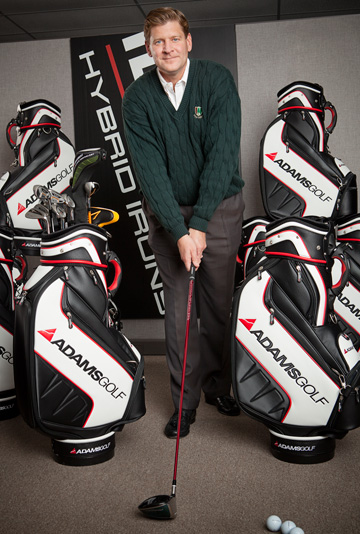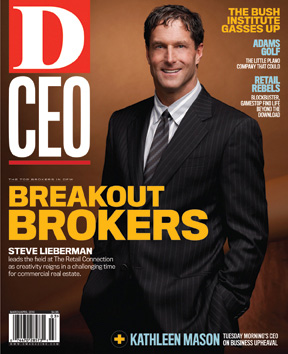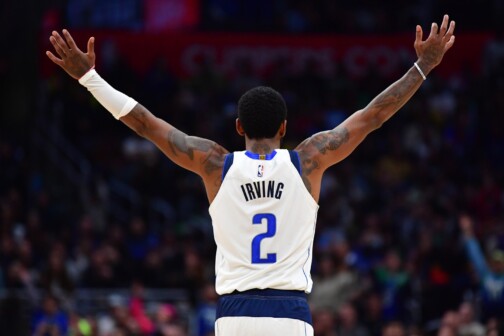Chip Brewer, the soft-spoken CEO of Adams Golf Inc., is sitting at Paesano’s Italian restaurant in Plano pondering the hundred-million-dollar success of his company, which is housed 10 minutes away in a row of nondescript white warehouses.
“We’re the home team. I wish more people knew that,” Brewer says. “Everything we design, ship, and sell comes from right here in Plano, Texas.”
Then he grins. “I tell people, ‘We’re just a little fairway wood company in Texas. Don’t worry about us.’ We’ll just kick your ass and take some business.”
That could be the motto of Plano-based Adams, which started out with the longest of odds with its Tight Lies Fairway Wood—sales now of 2 million units and counting—and has since evolved into one of the last remaining national golf companies, offering a full range of clubs.
It’s the ultimate Texas golf outsider, now battling the golf-equipment superpowers, with their decades of tradition and millions of advertising dollars, on an increasingly even footing.
“Every single major golf company—TaylorMade, Callaway, Ping, Titleist—all started with a single project and grew,” says Adams Golf founder and chairman Barney Adams. “That’s what we wanted to do at Adams. The naysayers called it a lucky fluke. Now our stuff is as good as anybody’s.”
It is, indeed. Last year, for the second straight year, a majority of the professional golfers on all three major American tours—the PGA, the Champions and the Nationwide Tour—were playing with hybrid clubs made by Adams Golf.
Sales in 2008 of $91 million were down from ’07 for the publicly traded company, just as they were for every company in the golf business, and sales for the first half of ’09 dropped by 20 percent. But market share and industry recognition for Adams, which today boasts 165 employees plus 65 independent sales reps, have never been higher.
Adams’ retail wood share in December 2009 was 8.1 percent and its retail iron share was 10.7 percent—both double-digit sales gains year to year, formidable increases in a down economy and a fragmented market.
Colleyville resident Chad Campbell, who fell a shot short in a playoff loss at the 2009 Masters tournament, gave the Plano company hours of precious advertising time wearing his Adams cap and playing with Adams clubs last April.
Brittany Lincicome, winner of the first LPGA Women’s Major Championship of 2009, is an Adams endorser, as is dominant Champions Tour golfer Bernhard Langer.
Adams hit the marketing jackpot last July, though, when endorser Tom Watson nearly wrote the golf story of the decade, losing in a playoff at the British Open at age 59.
“It was fantastic for him, for us, and for golf in general,” Brewer says.
While many fans and TV broadcasters only concentrate on a handful of golfers, those with name recognition or near the top of the leaderboard, a look into every bag on the PGA Tour this year would find a majority of non-driver fairway clubs made by Adams right here in Plano.
“How many people can go into a major golf store anywhere in America and see their name stamped on hundreds of clubs lining the aisle for people to buy?” says Adams, who’s commonly referred to as Barney or by his nickname, Barnyard. “That’s something I still take very seriously.”
Working together, Brewer and Adams have done something tough in any business—but nearly impossible in golf.
“It just shows, don’t ever give up on your dream,” says Clyde Smith, an early investor in the company.
Perhaps even more remarkably, the twosome managed to do it without growing to despise or sue each other into kingdom come.
“I had never heard of a company where a founder turned over the reins of the business and didn’t come back and meddle,” says Brewer. “To Barney’s credit, he hasn’t.”
“We get along fine,” Adams adds. “He only hates me when I send him a Monday morning e-mail.”
“Barney has been very supportive,” Brewer says. “Plus, he knows I still have a delete button for the e-mails.”

Inspired By Stanley Marcus
All of the 2009 high-flying successes, and all the framed news stories and fastest-growing-company awards lining the company’s walls, belie Adams Golf’s humble beginnings.
After an ill-fated partnership with short-game guru Dave Pelz in Abilene, Adams moved his fledgling Adams Golf company to North Texas in 1991. It was his second stop in the area, as he’d briefly sold store fixtures in Terrell in the 1970s. But when he arrived this time around he brought two big trucks full of self-described “company junk” from Abilene, which he personally unloaded.
From a small manufacturing building in Richardson, Adams set out to interact with potential club customers in the most direct way possible, winding up as a “club fitter”—he repaired clubs and sold some of his own—at Hank Haney’s Golf Ranch in McKinney.
Today, Haney is known for having been Tiger Woods’ personal teacher, and as the star of his own highly rated TV show, The Haney Project, on The Golf Channel. But in the early 1990s, Haney and Adams were just two passionate golf guys working for their own big break.
“Barney and I got it going together,” says Haney. “There were plenty of lean days, but Barney had the principle that he would take one customer and turn him into two. He would take two customers and turn them into four.
“I was at the range one day and he said, ‘Try this club and see what you think.’ It’s just amazing how it worked.”
Working alone in 1994-95, without the aid of a computer or any other modern tool, Adams sketched out his Tight Lies club—so-named for the tough golf “lie” that has the ball nestling uncomfortably close to the fairway grass. Then he set out to show the new club to as many people as possible.
Dozens of such golf projects are released every year; the only difference is that the Adams club actually worked as advertised. Its key: Adams turned the club’s head upside down, allowing the ball to be propelled faster and farther from the troublesome location. The more people used the Tight Lies club, the more Adams’ fame spread from the Haney ranch to across the country.
“There’s never much difference between products; they either get the ball in the air or they don’t,” Haney says. “Barney had a club everybody had to have. It actually got the ball into the air and it was a totally different design.”
After a lifetime of selling things he didn’t really enjoy or have much success with, Adams was obsessed with just two things. He was finally in the golf business, and he had an idea that would work regardless of how many turndowns he got.
“Dallas has this kind of an entrepreneurial spirit. It was easy to catch,” Adams says of his lean early days. “I didn’t know any of those guys at the time, but I could read about them in the paper—guys like Stanley Marcus and Herb Kelleher.
“Entrepreneurialism is established in your psyche. It is an attitude of, ‘It can be done. Move forward.’ ”
In those lonely, low-paying days at his small building in Richardson, or at the Haney Ranch in McKinney, Adams drew unlikely inspiration from Marcus, the Neiman Marcus scion whose stores Adams could barely afford to walk into.
“Stanley Marcus made a product you could be proud of. I wanted to do the same thing,” he says. “My job was to improve ball flight. His job was to make you look better when you walked out of his store.
“Another life lesson was, if you’re doing this for the money, forget it,” Adams adds. “You need to be passionate about what you are doing. That’s what helps you through many tough times.”

Involved And Passionate
With his Tight Lies club officially launched in 1996, things began to look up for Adams, thanks to the perfection of another long-time marketing tool, the TV infomercial.
Using his all-star Texas testimonial lineup of Haney, former British Open champion Bill Rogers of San Antonio, ladies golf Hall of Fame member Carol Mann from Houston, plus announcer Jack Whitaker, the Adams infomercial aired countless times in late 1996 and early 1997.
“I took a chance on Barney and the infomercial,” Mann says. “No one really knew what was going to happen, but I made a ton of money off a very small percent of the company.”
Adams’ timing was good, arriving on the scene as he did during the early days of The Golf Channel, when the channel had plenty of air space to fill and cheap rates for small but growing companies.
“I was the sixth employee hired,” remembers Ann Neff, a longtime Adams employee. “We started out with three offices in one small building. Barney could hear every phone call being made, and if he heard you saying something incorrectly about the Tight Lies, he would jump right in the middle of the call and correct you. That’s how involved and passionate he was.”
The infomercial for the club became a smash hit. Sales took off and forced Adams into a larger building in Plano. At the same time, word of mouth about the Tight Lies—Adams liked to say the club was so effective it gave golfers “the WOW factor”—was spreading nationwide.
All the buzz also helped draw Oliver G. (Chip) Brewer III, a man Adams had never met, into the golf business.
Brewer, whose father Gordon had been a national amateur golf champion, came from a distinguished, blue-blooded Northeastern family. While the Harvard MBA and the serial inventor/entrepreneur didn’t know each other, they had mutual friends, and Brewer had already had his own encounter with the Tight Lies.
“In 1997, I was on the driving range of my home course and one of my partners asked if I wanted to try the Tight Lies,” Brewer recalls. “I was always a good player, and I thought Tight Lies was for marginal players. I took the ‘too cool for school’ approach to the Tight Lies and never tried it.”
A little over six months later, Adams called Brewer with an offer: come to work for the company, and ultimately take over the entire operation.
Brewer, who had never been to Texas before, was immediately impressed with the state’s business climate—and the Adams product.
“When I was hired here, I put the club in my bag and quickly realized how stupid I had been not to use it,” Brewer says. “I thought Texas was all just cowboy hats and tough guys. There is some of that, but from a personal perspective, I love it here.”
When he arrived, Tight Lies sales were still on the upswing. But by the time Brewer was named president in 2000, the economic boom was over and the company was struggling mightily after raising $96 million in its initial public offering in 1998.
“I was just beating my head against the wall and wondering, ‘What the hell am I doing here?’ ” Brewer says.
Brewer was named CEO as well as president in 2002, with Adams becoming the non-executive CEO, handling a number of ceremonial functions and holding a seat on the Adams board as its chairman.
“Both men have a common goal,” says Neff, who continues to serve as Adams’ executive assistant and director of human resources. “I always liked working for Barney because I never saw anybody work harder in my life. He did everything.”
Brewer made a series of critical and timely successful decisions to turn the company around. He hired Tim Reed for the vital role of vice president of research and development, and poured millions of dollars into turning out new products.
He concentrated heavily on the Champions Tour, recruiting Watson and later Langer as company spokesmen. He also made the company’s hybrid lines accessible and popular for golfers of all age groups and skill levels.
Like the bottom-weighted Tight Lies Fairway Wood, the hybrid replaced a generation of 2-, 3-, and 4-irons with clubs that are easier to strike, making it easier to launch the ball into the air.
Beyond the early-2000s revenue dip, the company has had other challenges. Most notably it spent 10 years fending off a class-action lawsuit resulting from its IPO, whose offering documents allegedly failed to disclose material risks. Adams agreed last year to settle the suit for $16.5 million.
While Brewer, 46, says the company still considers itself an underdog—still intent on “kicking ass and taking business”—there is plenty of opportunity ahead as Adams continues its transformation into a major player in the golfing industry.
For his part, Adams, 71, has a new heart valve, a knee replacement—and an irrepressible spirit. He often plays golf when he’s in town at Preston Trail Golf Club, where he’s a member.
The late NorthPark Center developer “Ray Nasher was my hero,” Adams recalls. “He didn’t take up golf until his 80s. But one day I saw him on the range at Preston Trail and told him [he was my hero], and he just smiled.”
Of course, being the entrepreneur/promoter that he is, Adams made sure Nasher had the chance to hold and hit a Tight Lies club before leaving the course.






